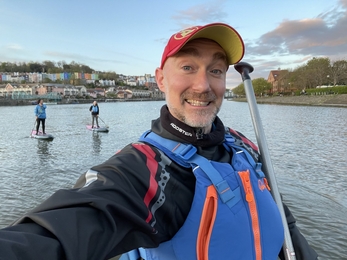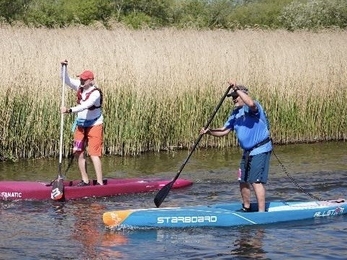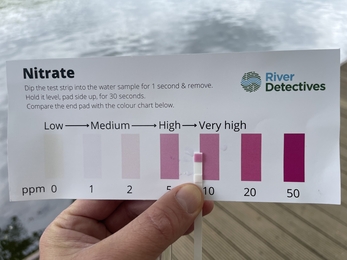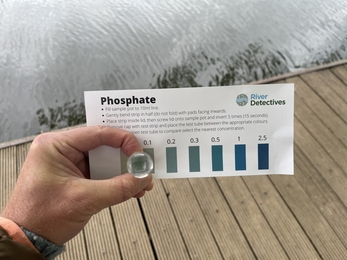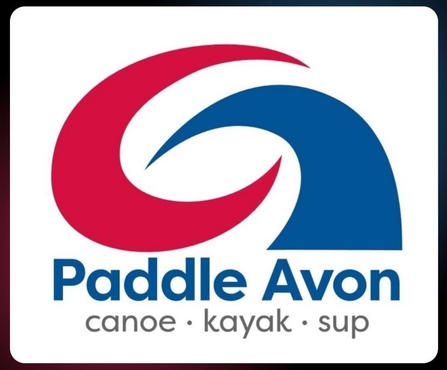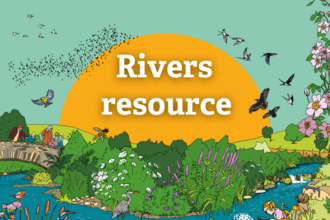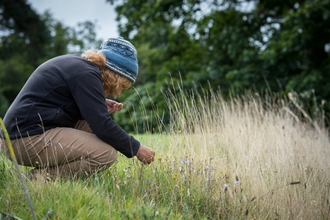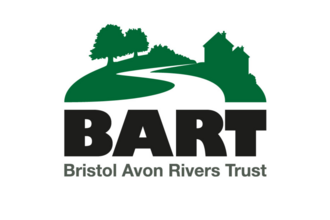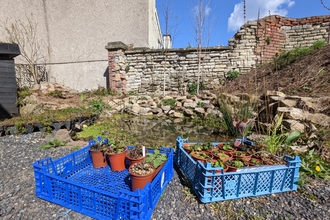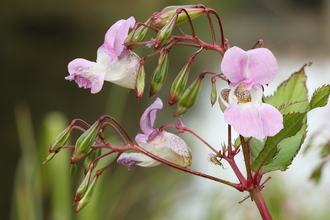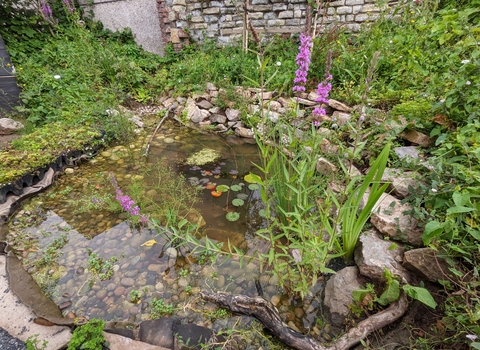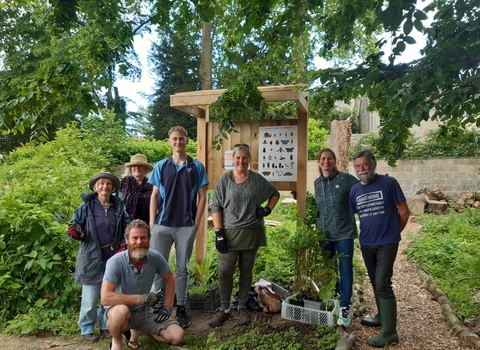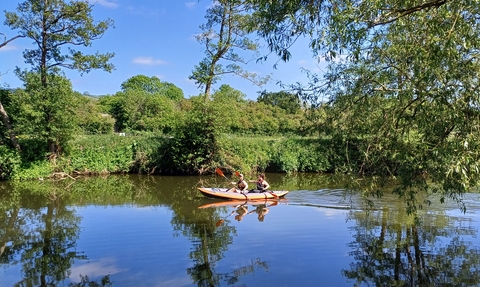
Sophie Bancroft
Paddle Avon
Protecting our waterways
Marcus Roberts is the Environmental Officer at Paddle Avon and paddleboard instructor with SUP Bristol. He spends time on the River Avon, mostly near Saltford, Keynsham, Bath and surrounding area's. And paddleboards on Bristol Harbourside.
Wildlife seen: beavers and beaver evidence, bats at dusk, birds - kingfishers, herons, Canadian geese, swans
Marcus is a passionate paddleboarder and has spent a lot of time in and around the rivers in Bath and Bristol harbourside. Paddle Avon is making a difference to local rivers – they all want the river to be healthy enough for them to be on the water and to be able to safely use the waterway in harmony with the surrounding ecology.
“I really enjoy paddleboarding, it enables me to detach myself from the normal stresses of day-to-day life, immerse yourself in nature and see a different perspective of the city from the water” says Marcus.
This new role at the club has been created to give dedicated time, resource and responsibility towards preserving and protecting local waterways and surrounding areas. Members of the club have a shared interest and love for their local environment, along with the wildlife in, on and around it.
Issues worth raising:
- Plastic waste and river pollution
- Climate change and flooding
- Raise awareness of wildlife near the river
- Action to take on the river - water quality moniting, citizen science
- Increase of INNS (invasive non-native species)
- Destruction of river banks and launch points
What have you noticed change about the river over the last few years?
River pollution
Over the years, Marcus has seen an increase in the levels of pollution in our waterways. Wet wipes and other debris is caught in the trees after flooding. Wet wipes contain plastic and chemicals that harm the ecology of the river. He finds this disheartening for a number of reasons, such as seeing how high the river rose to and the extent of the pollution entangled in the lower hanging branches. The greater visual presence of plastic pollution must be have a huge impact on wildlife in and near the river.
“it seems to be somewhat of a rarity now where you I'll go out paddling and see clear water free from debris” Marcus.
Less wildlife spotted, fewer numbers of birds on our waterways
Marcus has seen kingfishers, female kingfishers, herons, Canadian geese, swans and dippers. During spring time, when birds are nesting, it has been surprising him to notice seeing less young on the water. It's impossible o know exactly what the cause of it is, but is likely that factors like pollution are linked.
A great thing about paddling on the water at different times of the day is seeing different species of wildlife. Marcus has enjoyed seeing bats at dusk, skimming the water for food. Bats are a great indicator species for water health. There are plenty of flies and mayflies around, but there also seems to be less animals to eat them.
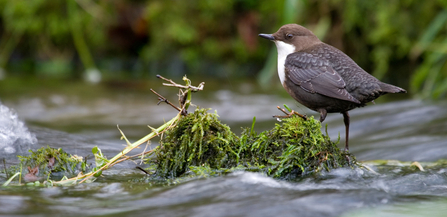
(c) Tom Marshall
More extreme weather events
In the last couple of years, extreme weather events have increased. Torrential downpours creates flash flooding, making it unsafe to go paddleboarding. On one occasion earlier this year (2025) the river level doubled in a 24 hour period, from around 0.7m to about 1.5m. This caused flooding in the buildings near to the water. The increase in waterflow creates underwater currents and increased debris and runoff. Luckily, there is a water level monitoring station in Saltford.
In opposition to more heavy rain, drought has also been noticed.
“but what surprised me is still how dirty the river's been - normally with less rainfall you'd start to see, in previous years, the river actually become a bit clearer. And actually what I have noticed is that it's not become clearer. The river is still quite murky which suggest to me that that it's not quite as healthy as it should be”.
This strengthens Marcus's desire to test the river quality and provide hard evidence and data to prove what’s happening.
Actions taken on the river
Action: Becoming a river detective
BART (Bristol Avon Rivers Trust) run a River Detective programme, which monitors water quality of local rivers on a long-term basis and is funded by Wessex Water, Bath & Northeast Somerset Council, Bristol Water, and the Bristol Avon Catchment Partnership. It invites local volunteers to get involved and make a difference by providing data that illustrates and proves the overall health of the river catchment.
Marcus takes part in this to address the fall in water quality, protect his local waterways and provide hard evidence rather than opinion about how healthy the River Avon is (or isn't). This testing shows that the state of the water isn't particularly healthy where we are.
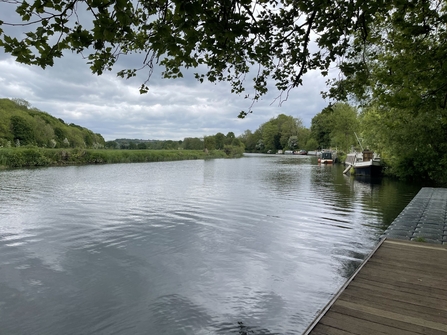
Marcus Roberts
The river detectives test the water for four things – phosphate, nitrate, water temperature and water cloudiness. This test is a good staring point when looking at water quality – especially when measured and monitored in the same area consistently in a shared database. It is sponsored by Wessex Water, who test for 21 different things to indicate water quality. E coli usually means poo, with an increased risk of illness.
Water quality is a huge interest and concern for the community of people who spend a lot of time on and in the water. People on kayaks may get splashed in the face or paddleboarders could fall into the water. No one wants to swallow E coli. Recording the data is an important step as Marcus has observed that the water isn’t healthy, this provides evidence.
"Phosphates, along with nitrates, are nutrients that enter watercourses through fertilisers, manure, sewage, waste, urban surface run-off and the use of household products such as washing detergents". BART.
(c) Bevis Watts
Action: Big River Watch
Citizen science is an influential action for nature to protect local biodiversity by providing evidence through observations. The key factor when taking part in monitoring species is where to record the data to have impact and make a difference. Citizen wildlife reporting
Large organised citizen science events are effective to get people involved in taking action, raising awareness and excitement about recording data and making sure it goes to the right place, influencing local decision making, policy makers and planning.
The club took part in the River Trusts amazing Big River Watch, which actively promotes people to look at the river side. Marcus could safely record what he saw on the water, looking at the direct impact on the river bank and what's actually floating in the water.
Action: litter pick on regular basis, team up with other litter picking groups on land.
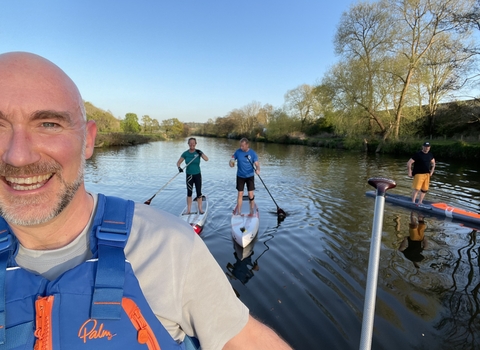
Marcus Roberts
Taking action for nature on the river
Marcus, Environmental Officer and the Paddle Avon community take action to protect their local rivers. Increased plastic waste and river pollution, climate change and reduced wildlife observations drove these actions. The connection to the river is strong and action is needed now.
- Water quality moniting
- Citizen science
- Litter picking
- Check Clean Dry campaign to limit INNS
- Responsible use of launch points
Check Clean Dry Campaign & INNS
All users of the community want to enjoy the river for recreation and to connect with nature on the water. They all want the river to be healthy enough for the club to use safely and in harmony with the surrounding ecology. The health and safety of the waterways is paramount to paddle sports. Therefore the ‘Check Clean Dry’ campaign is important for a number of reasons. Even a tiny drop of water can carry a new species. It’s good to be aware of what to look for as it isn’t always obvious.
- Good practice for upkeep of equipment
- Stop the spread of INNS, especially when going to new locations.
Invasive non-native species (INNS) can be any organism! It can be a plant, animal, fungus or algae that is not indigenous or native to a particular area. They can cause great environmental and economic harm to the area by upsetting the natural balance. On the river, INNS can clog up waterways, reduce water quality, increase the threat of flooding and threaten native species that support and harmonise with the local river ecosystem. INNS to be aware of:
Himalayan balsam
Floating pennywort
Hottentot fig
Giant hogweed
False virginia creeper
Water primrose
Broadleaf watermilfoil
Your local community group may hold events to limit the spread of INNS, get involved!Invasive non-native species guide - written by the Team Wilder Community Ecologist
Paddle UK INNS advice
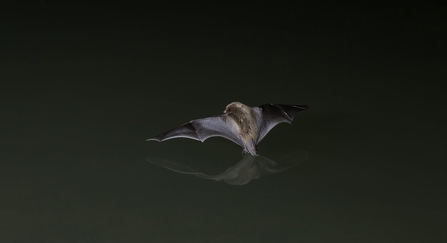
Daubenton;s Bat, myotis daubentoni, adult, trawling for food, england - Dale Sutton/2020vision
The importance of Launch points
It's safer and easier if you find an actual launch point to get into the water. It is important to understand that the riverbank holds quite an ecosystem of wildlife, that all interlaces, interacts and protects the sides of the rivers from erosion and various other things. The more time you spend on the river, the more destruction it causes when official launch points are not used. If the riverbank erodes, it can cause landslides and directly effect the local ecology. Limit the damage and maximise the habitats.
Resources
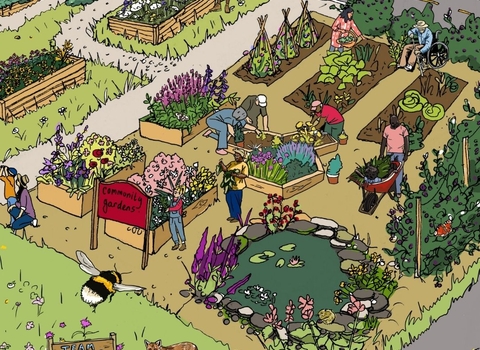
(C) Hannah Bunn
Be part of Team Wilder
All actions for nature collectively add up and creates life for people and wildlife.
Share your actions for nature, like Tom by sharing and tagging @avonwt on social media and
Log your actions for nature on the map

